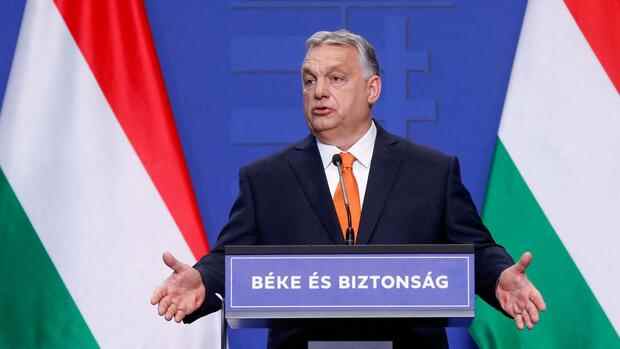Vienna Hungary versus the EU: This conflict has also flared up over the question of an oil embargo against Russia – and Hungary’s government seems to be celebrating the dispute again. The proposal for an embargo comes from Brussels, the bureaucratic center of the EU, and not from the member states, says Zoltan Kovacs, Hungary’s State Secretary for International Communications and Relations.
Other countries in the region have also expressed concerns, such as Slovakia, the Czech Republic and Bulgaria. The EU is said to be trying to allay the reservations by allowing certain states to continue buying Russian oil until the end of 2023.
Nevertheless, Hungary’s government under Prime Minister Viktor Orban is currently giving the impression that it wants to vote against the oil embargo. The coming days will show what mirror fencing is here: perhaps the politician is just playing poker. In this case, his calculus would be as follows: Hungary agrees to an oil embargo and finally receives money for it from the EU recovery fund, the economic stimulus package that the union of states created in the wake of the Covid 19 pandemic.
Politically, the states of Central Europe have taken different positions on the Ukraine war. The governments of the Czech Republic and Slovakia are demonstrating their steadfastness towards Russia. “If Ukraine falls, Putin will carry on,” said Czech Foreign Minister Jan Lipavsky in a CNN interview some time ago. “Russia occupied us back in 1968. We don’t want that again.”
Top jobs of the day
Find the best jobs now and
be notified by email.
The Czech Republic and Slovakia are therefore supplying arms to Ukraine. Such aid is out of the question for Orban. He even rules out military material being transported to neighboring Ukraine via Hungarian territory.
Hungarians’ problems are homegrown
Economically, Hungary is in a difficult situation, for which Orban is largely responsible. Since 2014, the country has become increasingly dependent on Russia for energy supplies. For example, around 60 percent of the oil consumed by companies and households comes from there.
The Czech Republic has also raised concerns about the embargo.
(Photo: via REUTERS)
Ahead of the April 3 elections, the politician generously handed out campaign gifts, such as a 13th pension for retirees and a tax refund for families. That puts a strain on the state budget. So the last thing Orban needs is more economic troubles triggered by an energy boycott.
At the same time, the prime minister is fighting high inflation in typical autocratic fashion by freezing the prices of selected groceries and petrol. Above all, Orban got into trouble with the fuel limit. In November he pegged the price of petrol at 480 forints (€1.30) per liter and recently extended this measure until the end of July.
This market intervention has already caused turbulence, and if an oil embargo were to result in sharply rising prices, these would only increase. The main victims are the petrol station owners. For a long time, they had to buy petrol at wholesale prices, but they could only ask for the limited price per liter themselves.
This increasingly drained their financial substance, which created a dangerous situation for Orban. “Small” business owners are an important clientele that he can’t let down. For some time now, gas stations have been allowed to buy petrol from the semi-public energy company MOL for 480 forints per liter.
This, in turn, caused a bit of displeasure at the head of the company, Zsolt Hernadi. The manager close to Orban said he didn’t know how long such a price regime could be maintained. This shows once again: upper price limits always get stuck somewhere.
Germany also has change requests
Despite the limits, inflation in Hungary has recently risen to 8.6 percent. The other countries in Central Europe are also suffering relatively severely from inflation. First, it tends to be higher in the region than in the west of the continent, at 11.9 percent in the Czech Republic and 10.5 percent in Bulgaria. Second, countries are poorer on average. That’s why they rightly perceive inflation as a burden: Those who earn little suffer doubly from rising energy and food prices.
Unlike the European Central Bank (ECB), the region’s central banks cannot be accused of playing down inflation. Slovakia is part of the euro zone and is dependent on the ECB for monetary policy; Hungary and the Czech Republic, on the other hand, have their own currencies and recently repeatedly raised interest rates. In June 2021, the Czech Central Bank (CNB) was one of the first central banks in the world to herald the change in monetary policy. And on Wednesday it raised the rate again, this time by 75 basis points to 5.75 percent.
>>> Also read here: “Doing something that Germany hasn’t experienced for a long time” – Floating LNG terminals should be ready in winter
Stagnation and high inflation are real dangers in Hungary, the Czech Republic, Slovakia and Bulgaria. Especially since the countries are more dependent on industry than Western European locations. Forecasts by analysts at Erste Group are therefore likely to sound all the more ominous to them: If Russia immediately cut off oil supplies in response to the impending embargo, this would have a major impact on the price of the commodity, the bank’s economists write. Oil prices would not yet reflect such an action.
But Germany is also demanding changes to the EU Commission’s proposals for new sanctions against Russia. Among other things, the federal government is calling for even stricter action against the Russian Sberbank and restrictions on civilian nuclear cooperation with Russia, as the German Press Agency learned from diplomats on Thursday.
Recently there has also been resistance from countries such as Cyprus, Greece and Malta. They fear that a transport ban on Russian oil, which is also planned, will unilaterally disadvantage their shipping companies.
With agency material
More: Does an oil embargo against Russia make sense?
